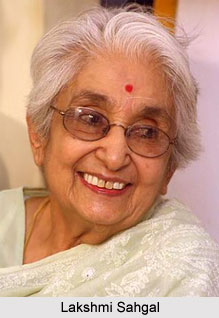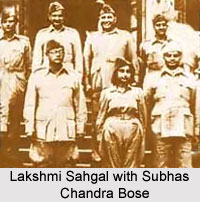 Lakshmi Sahgal, also known as Lakshmi Sehgal, was one of the Indian freedom fighters who fought against the British Empire in India and considerably contributed to the Indian freedom struggle. She was among the prominent officers of the Indian National Army under the leadership of Netaji Subhas Chandra Bose. Lakshmi Sahgal was also the Minister of Women`s Affairs in the Azad Hind government. She held the rank of Captain in the Indian National Army (INA) at the time of her imprisonment in Burma. Thus she was referred to as Captain Lakshmi in India.
Lakshmi Sahgal, also known as Lakshmi Sehgal, was one of the Indian freedom fighters who fought against the British Empire in India and considerably contributed to the Indian freedom struggle. She was among the prominent officers of the Indian National Army under the leadership of Netaji Subhas Chandra Bose. Lakshmi Sahgal was also the Minister of Women`s Affairs in the Azad Hind government. She held the rank of Captain in the Indian National Army (INA) at the time of her imprisonment in Burma. Thus she was referred to as Captain Lakshmi in India.
Early Life of Lakshmi Sahgal
Lakshmi Sahgal was born as Lakshmi Swaminathanin on 24th October 1914, in Madras (Chennai), Madras Presidency under British India. Dr. S. Swaminathan, her father, was a lawyer who practiced criminal law at Madras High Court. Her mother Ammu Swaminathan or A.V. Ammukutty was an independence activist and a social worker who belonged to the Vadakkath family of Anakkara in Palghat, Kerala.
In the year 1938, Lakshmi Sahgal received her MBBS degree from Madras Medical College. She received her diploma in Gynaecology and Obstetrics in the next year. Sahgal went to Singapore in 1940 and founded a clinic for the deprived and poor, most of whom were Indian migrant labours. During this period, she participated in the India Independence League.
 Lakshmi Sahgal in Indian National Army
Lakshmi Sahgal in Indian National Army
During the surrender of Singapore to the Japanese by the British Empire in the year 1942, Lakshmi Sahgal helped and supported injured prisoners of war. Most of these soldiers were motivated to establish an Indian liberation army. Netaji Subhas Chandra Bose, one of the most renowned Indian independence activists, went to Singapore on July 2, 1943. He was focused on setting up a women`s regiment that would fight for Indian freedom against the British rule. Inspired by him, Lakshmi Sahgal joined the new division, which was known as the Rani of Jhansi Regiment. She was appointed at the rank of Colonel in the women`s army unit, which was perhaps the first of its kind in entire Asia. The regiment fought on the side of the Axis powers against the British Colonial forces.
Later Life of Lakshmi Sahgal
After the Indian independence, Lakshmi Sahgal became a member of the Communist Party of India Marxist (CPI M) and represented the party in the Rajya Sabha (Upper House) and served in the Indian Parliament. During the crisis in modern Bangladesh, Sahgal conducted and managed relief camps and provided medical aid in Calcutta (now Kolkata) for the refugees who came from Bangladesh to India.
She was elected as a candidate in the presidential elections in 2002 of 4 leftist parties, namely the All India Forward Bloc, the Revolutionary Socialist Party, the Communist Party of India (Marxist) and the Communist Party of India. Lakshmi Sahgal was the only opponent of A.P.J. Abdul Kalam.
Personal Life of Lakshmi Sahgal
Lakshmi Sahgal was married with Colonel Prem Kumar Sahgal in Lahore (now in Pakistan), British India in March 1947. The couple later settled in Kanpur, where Lakshmi Sahgal continued with her medical practice and helped the refugees who arrived in big numbers after the Partition of India. The couple had a daughter named Subhashini Ali. She is a leader of the All India Democratic Women`s Association, which is politically affiliated to the Communist Party of India (Marxist). Lakshmi Sahgal was an atheist through out his life. She was honoured with the Padma Vibhushan Award in the 1998 by K. R. Narayanan, the former president of India.
Captain Lakshmi Sehgal suffered from cardiopulmonary arrest on 19th July 2012. She died on at 11:20am on 23 July 2012, at the age of 97, in Kanpur. Her body was donated for medical research to the Kanpur Medical College.






































